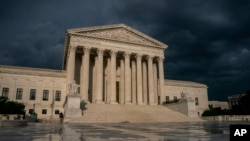U.S. Supreme Court justices on Tuesday questioned a lawyer for President Donald Trump and a Justice Department attorney who are defending the president's efforts to thwart congressional attempts to acquire his financial records.
The questioning occurred during oral arguments on appeals of three lower court decisions involving subpoenas of Trump's tax and financial records.
The hearings amount to an important showdown over the powers of the presidency after Trump filed legal challenges to subpoenas issued last year by several Democratic-led House of Representatives committees and a New York district attorney.
Subpoenas seek financial information from the accounting firm Mazars as well as Deutsche Bank and Capital One.
Another case involves Trump's attempts to block enforcement of a New York City prosecutor's subpoena for his financial records.
When asked by conservative Chief Justice John Roberts if legislators can ever subpoena a president's financial records, Trump attorney Patrick Strawbridge responded it was "difficult to imagine" a situation that would warrant it.
Liberal Justice Elena Kagan told Strawbridge, however, that "the president is just a man" when personal information is concerned.
"What it seems to me you're asking us to do is to put a kind of 10-ton weight on the scales between the president and Congress, and essentially to make it impossible for Congress to perform oversight and to carry out its functions," Kagan said.
But Justice Department lawyer Jeffrey Wall maintained that allowing the congressional subpoenas would result in presidents being "harassed" over their private activities.
"It is not much to ask that before the House delves into the president's personal life it explains in some meaningful way what laws it is considering and why it needs the president's documents in particular," Wall said. "The subpoenas here don't even come close."
Trump has sought to keep his personal and corporate financial information private, including breaking with decades of tradition of presidential candidates releasing tax returns. Lower court decisions have so far gone against Trump, but the records have remained private pending the Supreme Court appeal.
Key issues
The records requests focus on two issues. One is the work of congressional committees to examine unlawful activity in the banking system such as money laundering, whether there is adequate regulation and if new legislation is needed.
The other issue is the examination of Trump and his business in connection with payments made to Trump's former personal lawyer Michael Cohen to prevent two women from publicly discussing their claims of having extramarital affairs with Trump.
Supreme Court justices are specifically examining whether the House committees had the constitutional and statutory authority to issue subpoenas to third parties demanding the personal records of the president.
Trump's legal team has argued lawmakers should have to identify a legitimate legislative purpose for seeking the president's financial information.
The U.S. Court of Appeals for the Second Circuit ruled in December that the committees have sufficiently identified their purposes.
"The Committees' interests in pursuing their constitutional legislative function is a far more significant public interest than whatever public interest inheres in avoiding the risk of a Chief Executive's distraction arising from disclosure of documents reflecting his private financial transactions," Judge Jon O. Newman said in writing for the majority.
Because of the coronavirus pandemic, the nine Supreme Court justices are hearing the cases by telephone. They are likely to issue their rulings next month.












